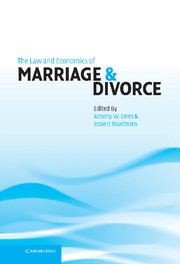Book contents
- Frontmatter
- Contents
- List of tables and figure
- List of contributors
- 1 Introduction
- 2 Marriage: the long-term contract
- 3 Marital commitment and the legal regulation of divorce
- 4 Mutual consent divorce
- 5 An economic approach to adultery law
- 6 Louisiana's covenant marriage law: recapturing the meaning of marriage for the sake of the children
- 7 Cohabitation and marriage
- 8 Marriage as a signal
- 9 For better or for worse? Is bargaining in marriage and divorce efficient?
- 10 Weak men and disorderly women: divorce and the division of labor
- 11 The impact of legal reforms on marriage and divorce
- 12 European divorce laws, divorce rates, and their consequences
- Index
- References
4 - Mutual consent divorce
Published online by Cambridge University Press: 13 August 2009
- Frontmatter
- Contents
- List of tables and figure
- List of contributors
- 1 Introduction
- 2 Marriage: the long-term contract
- 3 Marital commitment and the legal regulation of divorce
- 4 Mutual consent divorce
- 5 An economic approach to adultery law
- 6 Louisiana's covenant marriage law: recapturing the meaning of marriage for the sake of the children
- 7 Cohabitation and marriage
- 8 Marriage as a signal
- 9 For better or for worse? Is bargaining in marriage and divorce efficient?
- 10 Weak men and disorderly women: divorce and the division of labor
- 11 The impact of legal reforms on marriage and divorce
- 12 European divorce laws, divorce rates, and their consequences
- Index
- References
Summary
Voluntary agreements have a central role in the efficient allocation of society's scarce resources. Subject to their constraints, people are assumed to pursue the transactions from which they expect the largest net benefits. Economists generally see little need for legal restrictions on the conditions that the transacting parties impose on themselves except when there are substantial external effects or a party has inordinate market power. Even then, efficiency dictates that legal restrictions force people to recognize the external costs or benefits of their actions or limit the exercise of market power rather than prohibit certain aspects of transactions. Yet when people reach probably the most important agreement of their lives – the decision to marry – they have very little control over the arrangement into which they are entering, owing to legal restrictions imposed on their transaction by the state. They have essentially no control over the basis upon which their agreement will be terminated, and, if it is terminated, the legal system gives them only limited control over the repercussions of the termination. Although a divorce can have external effects on the couple's children and society at large, the law does not address these concerns systematically. Market power is not a concern about these agreements.
In this chapter, I argue that increasing individuals' control over their marriage, especially the circumstances in which their marriage will be dissolved and the financial arrangements if that occurs, would be an improvement over the fault and no-fault grounds for divorce and the statutory requirements for the financial and custodial arrangements that have existed in the United States.
- Type
- Chapter
- Information
- The Law and Economics of Marriage and Divorce , pp. 57 - 69Publisher: Cambridge University PressPrint publication year: 2002
References
- 4
- Cited by



